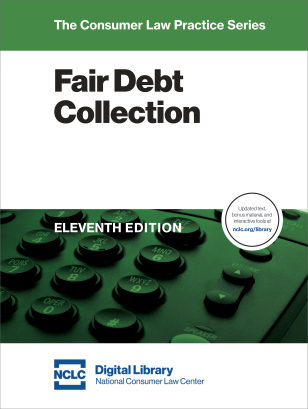- Bankruptcy Code does not preclude FDCPA claims: Johnson, infra. For other cases, see Fair Debt Collection § 8.11.
- The FDCPA’s statute of limitations begins to run when plaintiff knows or had reason to know of the violation: Lyons, infra, and see also § 6.10 for related cases.
- The bona fide error defense after the circuit court changed its interpretation of the law : Oliva, infra, and see also § 7.2 for related cases.
- Whether FDCPA is violated where collector dismissed case when consumer defended: St. John, infra, and see also § 5.5.8 for related cases.
Johnson v. Midland Funding, L.L.C., ___ F.3d ___, 2016 WL 2996372 (11th Cir. May 24, 2016). The Bankruptcy Code does not preclude claims under the FDCPA. Debt collectors who file proofs of claims on time-barred debt may be liable for violations of §1692e or §1692f.
Lyons v. Michael & Assoc., ___ F.3d ___, 2016 WL 3192623 (9th Cir. June 8, 2016). Plaintiff filed an FDCPA lawsuit for §1692i venue violations more than one year after the collection action was filed, but within the one year period after she was served with process in that action. Applying Mangum v. Action Collection Service, Inc., 575 F.3d 935 (9th Cir. 2009), the court held that the FDCPA’s one year statute of limitations in §1692k(d) begins to run when plaintiff knows or has reason to know that the violation took place and that the discovery rule applies regardless of the type of FDCPA violation alleged. The court further clarified that Naas v. Stolman, 130 F.3d 892 (9th Cir. 1997) stands for the proposition that the filing of the underlying collection lawsuit forms the basis of the action but does not address the discovery rule.
Oliva v. Blatt, Hasenmiller, Leibsker & Moore, L.L.C., ___ F.3d ___, 2016 WL 3262370 (7th Cir. June 14, 2016). The debt collector filed suit in a venue that would have been permissible under the Seventh Circuit’s interpretation of §1692i in Newsom v. Friedman, 76 F.3d 813 (7th Cir. 1996), but the venue violated 1692i as interpreted by Suesz v. Med-1 Solutions, LLC, 757 F.3d 636 (7th Cir. 2014) and that decision applied retroactively to cases previously filed. See Fair Debt Collection § 5.9. In this unusual case, the court held that the debt collector’s act of filing in a venue that violated Suesz was a bona fide error under 1692k(c). The court concluded that Jerman v. Carlisle, 559 U.S. 573 (2010) did not preclude this result because the error was caused by Defendant abiding by the then controlling Newsom decision and any mistaken interpretation of the law was attributed to the Seventh Circuit rather than the Defendant.
St. John v. Cach, L.L.C., ___ F.3d ___, 2016 WL 2909195 (7th Cir. May 19, 2016). Plaintiffs failed to state a claim when they alleged that debt collectors who dismissed collection actions violated 1692e(5) because they had no intention to try these cases – as illustrated by the fact that the debt collectors voluntarily dismissed the litigation once plaintiffs defended against the lawsuit rather than settling or defaulting. The court held that “Section 1692e(5) of the FDCPA does not require debt collectors to intend to proceed to trial when filing a lawsuit to recover a debt.” Plaintiffs did not deny owing the debt or claim that debts were otherwise unenforceable.


